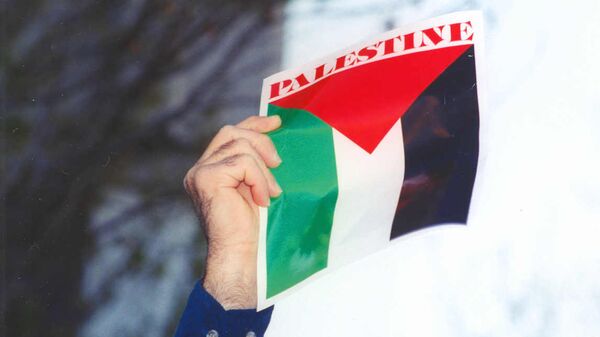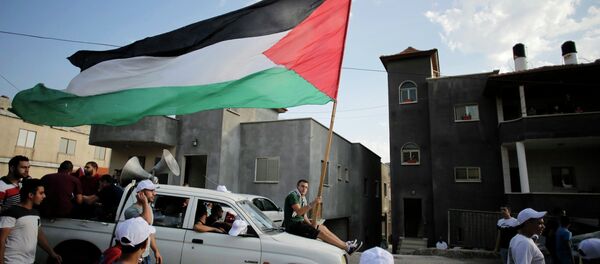The Palestinian resolution that flags of non-member observer states "shall be raised at [UN] Headquarters [in New York] and United Nations Offices following the flags of the member states" was passed by 119 of the 193 general assembly members in an overwhelming vote of support for Palestinian recognition.
However, the vote also revealed the deep divide in European opinions over the Palestinian issue.
Here's the final vote on #Palestine (and Vatican) flag resolution at the UN. pic.twitter.com/Z3FKKWC6Ls
— Samuel Oakford (@samueloakford) September 10, 2015
Among the countries that voted in favor of the resolution were France, Russia, Sweden, Italy, Spain and Belgium, however the majority of EU states, including the UK and Germany were among the 45 countries to abstain from the vote.
Eight nations, headed by the US and Israel, voted against the resolution, which Palestinian prime minister Rami Hamdallah described as "a step to the recognition of Palestine as a full member state of the United Nations."
History made Thurs as #UNGA adopts resolution saying flags of non-member observer States to be raised at UN offices http://t.co/WBYrwCTOCB
— United Nations (@UN) September 11, 2015
Israel's UN Ambassador Ron Prosor criticized the move, saying "the assembly would vote to declare the Earth is flat if the Palestinians proposed it," while US ambassador Samantha Power expressed concerns that raising the Palestinian flag would only increase tension between Israelis and Palestinians.
Europe Divides Evident
While the opposition from Washington and Israel was expected, Europe's deep divisions over the Palestinian matter have been exposed in the vote.
Alongside Russia, France and Sweden have led European calls for a two-state solution, with Sweden becoming the first western European EU nation to officially recognize the state of Palestine in October last year.
The decision, thought to have been sparked in part by Israel's 2014 summer offensive in Gaza and an impasse in negotiations over the creation of a Palestinian state, triggered a wave of pro-Palestinian support in Europe, with the French and Irish parliaments among those approving resolutions calling on their respective governments to formally recognize the state of Palestine.
A similar symbolic resolution was passed by the UK parliament, however Prime Minister David Cameron, who abstained from the vote, referred to current British policy, which "reserves the right to recognize a Palestinian state bilaterally at the moment of our choosing and when it can best help bring about peace."
British government officials were widely criticized and accused of ignoring the wishes of parliament and the British people for not formally recognizing Palestinian statehood.
Two-State Solution Debate
Central to the push for Palestinian recognition has been the halt in negotiations between Israel and Palestinian officials over the so-called two state solution.
While Israel officially says that it supports the creation of a Palestinian state, critics have accused the country of actively prolonging talks and undermining the right to Palestinian statehood.
An estimated 500,000 Jewish Israelis live in settlements in the West Bank and around East Jerusalem, with critics pointing out that the illegal settlements have been built on occupied Palestinian land held by Israel since 1967.
Talks between Israel and Palestine have been on hold since April last year. Israeli officials halted negotiations after Fatah, a faction of the semi-ruling Palestinian Authority (PA), declared peace with Gaza-based Hamas, who Israel considers to be a terrorist group.
— Palestine Trends (@Palestinolizer) September 11, 2015
I'm not anti-Israel, I'm pro-Palestine. #PalFlag is an important step towards recognition. https://t.co/0B29W38Vd6
— charlotte (@charliehayes) September 10, 2015
While Israel considers Hamas, the ruling party in Gaza, to be a terrorist group, others in Europe only consider the group's military arm to be a terror organization.
Relations deteriorated to arguably their worst levels in many decades following last year's Israeli offensive of Gaza, which resulted in the deaths of more than 2,000 Palestinians.
Palestinian officials claimed that the impasse over negotiations for a two-state solution forced the PA to turn to the international community, with Palestine joining the International Criminal Court (ICC) and further pursuing Palestinian issues with the UN.
Meanwhile, it was also reported that former British Prime Minister and Middle East Peace Envoy Tony Blair was having secret meetings with Hamas leaders earlier this year in an attempt to come to an agreement with Israeli officials.





